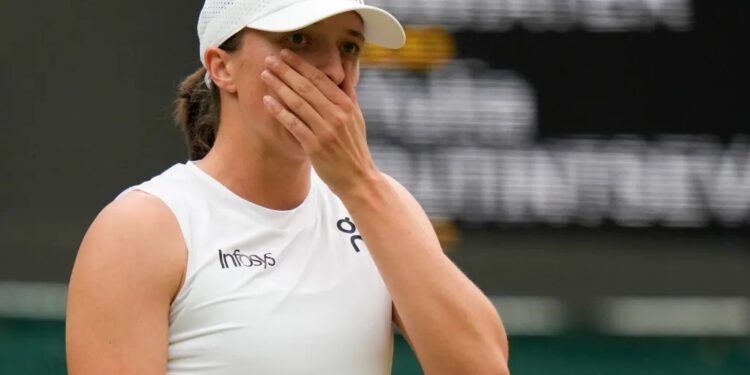INTRODUCTION:
Corruption in sports has been a longstanding issue, but the recent revelations surrounding tennis stars Simona Halep and Iga Świątek have cast a spotlight on the darker side of the sport. Halep, who has been banned for a doping violation, recently made some shocking comments about her fellow player, Iga Świątek, accusing her of involvement in doping practices. These remarks have stirred up a storm of controversy within the tennis community, prompting former ATP players and commentators to offer their own opinions on the situation. The term “corruption is everywhere” has echoed loudly across various tennis circles, raising questions about integrity and fairness in the sport.
Simona Halep’s Allegations: A Bombshell for the Tennis World
Simona Halep’s comments about Iga Świątek have sent shockwaves through the tennis world. Halep, who was banned in 2022 after testing positive for the banned substance roxadustat, made her statement in an interview where she was asked about doping in the sport. She accused Iga Świątek, the world number one, of being involved in doping scandals, alluding to the idea that she may be using performance-enhancing drugs to maintain her dominance.
Halep’s comments are especially explosive considering her status as one of the leading female players of the past decade. Her allegations are made all the more impactful given the ongoing investigations into her own case and the scrutiny she has faced as a result. In many ways, her statements could be interpreted as an attempt to deflect attention from her own situation, but they have sparked a broader conversation about corruption in tennis, and sports in general.
The Response from Iga Świątek: Defending the Truth
Iga Świątek, for her part, has vehemently denied the accusations. The Polish player, widely admired for her aggressive play and mental toughness, took to social media to defend herself, stating that she had never been involved in doping and found the accusations to be baseless. She emphasized her commitment to fair play and her rigorous adherence to anti-doping regulations, reaffirming her position as one of the cleanest athletes in the sport.
Świątek’s response was measured, but it is clear that the allegations have had a significant impact on her. As the face of women’s tennis, Świątek has not only faced the pressure of high expectations but also the burden of having her integrity questioned by a former top player. This only adds to the complex layers of challenges athletes face in the public eye, where their careers are scrutinized from every angle.
Former ATP Player’s Opinion: The Bigger Picture
As the controversy continues to unfold, former ATP players have begun offering their own thoughts on the situation, which highlight a larger, pervasive issue in professional tennis. Many former players have pointed out that doping scandals in tennis, as in many other sports, are often just the tip of the iceberg. While Halep’s comments may be fueled by her own personal frustrations, they open the door to a wider discussion about the presence of corruption in tennis.
Former ATP player, who spoke anonymously, commented that doping is likely more widespread than the public acknowledges. “We’ve only scratched the surface,” he said. “There are so many athletes, especially at the top level, who are under pressure to perform at increasingly higher levels. The temptation to use substances is real, and while the majority of players are clean, the system is not perfect.”
This insight adds to the narrative that corruption in sports may be systemic, not just the actions of a few bad apples. Doping, match-fixing, and questionable practices in contracts are issues that continue to haunt professional sports across the world. The systemic pressure for athletes to perform at elite levels, coupled with the stakes involved, can create an environment ripe for corruption.
The Debate Over Tennis Integrity
The bigger question remains: Is tennis – or any other sport for that matter – truly free from corruption? Halep’s allegations, regardless of their accuracy, expose cracks in the system. They highlight how personal grievances and rivalries can spiral into accusations that go beyond the individual and point to a much deeper issue at play.
Sports organizations like the International Tennis Federation (ITF) and the World Anti-Doping Agency (WADA) have made significant strides in cleaning up the sport, but many critics argue that their efforts are often reactive rather than proactive. Athletes like Halep and Świątek may be subjected to rigorous testing, but the temptation to cheat is always present in a high-stakes environment.
One prominent ATP commentator noted, “When you have athletes at the pinnacle of success, the financial rewards and pressures become immense. It’s easy to see how corruption can creep in, especially when people are desperate to maintain their position at the top.”
Conclusion: A Need for Greater Transparency
Simona Halep’s bombshell comments regarding Iga Świątek’s alleged involvement in doping underscore the ever-present issue of corruption in sports. While Świątek’s innocence remains unproven, Halep’s statements serve as a reminder that corruption, whether in the form of doping or other illicit activities, is an unfortunate reality in competitive sports. As former ATP players have pointed out, the issue is far more widespread than we might want to believe.
The true measure of success in sports should not be determined by the number of titles won, but by the integrity with which athletes conduct themselves. Until systems of oversight and transparency in tennis and beyond are strengthened, the shadow of corruption will continue to hang over the sport.
Ultimately, the challenge remains for tennis to rise above these controversies, reaffirm its commitment to fair play, and restore confidence in its athletes and governing bodies. Only with systemic change can the sport move forward, free from the cloud of corruption that has tainted its reputation for too long.
























